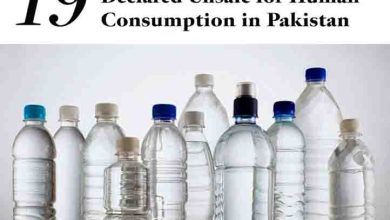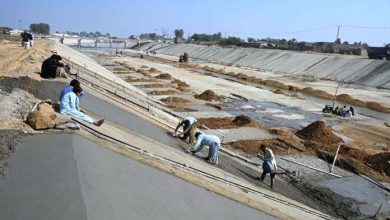Science-based actions vital for greater water security: Dr.Mohsin
Climate Change is intensifying water risks, extreme floods and droughts: Dr. Mark Smith
- Pakistan needs multi-stakeholders to combat growing water security Crisis.
- Science-based action vital for greater water security: Dr.Mohsin
- Climate change is intensifying water risks, extreme floods and droughts: Dr. Mark Smith
- “Pakistan will face 30% water shortfall by 2030 whereas at present over 60% population in the country is drinking unclean water: Dr. Muhammad Ashraf
- Pakistan needs to improve on-farm water use efficiency.
- Youth engagement in all water conservation programs is critical: Simi Sadaf Kamal
- Systematic approach guided by ground realities and scientific evidence is needed to deal with the climate shocks
Islamabad: #Pakistan needs to establish an effective network of all segments of the society from scientists to policy makers to civil society with a focus on mainstreaming youth and gender to address growing #water security prevailing across the country.
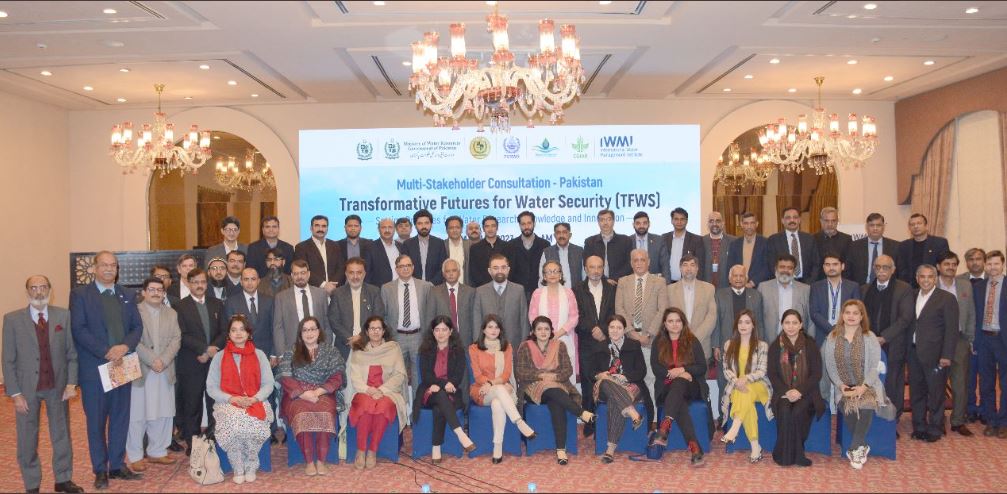
These insightful solution oriented ideas and views sere expressed by water experts speaking at a multi-stakeholder consultative workshop themed ‘Transformative Futures for Water Security (TFWS) – Setting priorities for water research, knowledge, and innovation” , organized by the International Water Management Institute (IWMI) in partnership with Pakistan Council of Research in Water Resources (PCRWR), Federal Flood Commission, Ministry of Water Resources, Federal Water Management Cell, Ministry of National Food Security & Research.
Over 60 representatives from the federal and provincial governments, donors, civil society, academia, public and private sector organizations participated in the consultative workshop. IWMI had developed the TFWS Initiative with the foundation of bottom-up approach rooted in South-South dialogue, youth to co-guardianship among others.
Reflecting on the worsening #watercrisis in Pakistan, Dr. Mohsin Hafeez, Country Representative – Pakistan and Regional Representative – Central Asia, IWMI, briefed the participants regarding the objectives of the consultation.
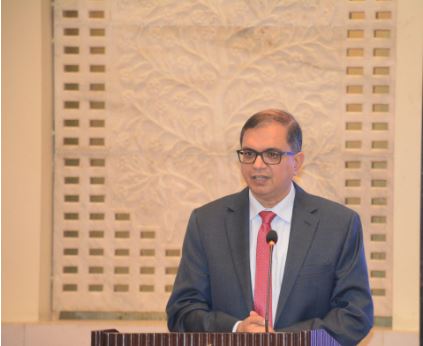
“Pakistan has the lowest water security in terms of urban, economic, environmental, and other factors linked to the subject”, he said.
“There is a need to take bold steps for addressing water scarcity prevailing across the country. We need to build joint commitments to science-based action on water security across policy, development, business, and science constituencies for greater water security”, he further added.
Dr. Mark Smith, Director General, IWMI through his video message, introduced the Transformative Futures for Water Security (TFWS) Initiative led by IWMI, its rationale and the need for ensuring water security in the region.

“The latest IPCC report’s message on #climatechange and water is very clear, that climate change is intensifying hydrological water cycle which means an increase in water risks and extreme floods and droughts, Dr. Smith said.
Highlighting the partners of solution for water scarcity, he said “behind our initiative is an underlying question of who to lead this bold step towards water security and the answer to it is that the youth, policymakers, business, communities, farmers, conservation organizations, and sectors beyond water will lead this action.”
Elaborating the current scenario of water crisis in Pakistan, Dr. Muhammad Ashraf, chairman, Pakistan Council of Research in Water Resources (PCRWR) said, “Pakistan will face 30% water shortfall by 2030 whereas at present over 60% population in the country is drinking unclean water.
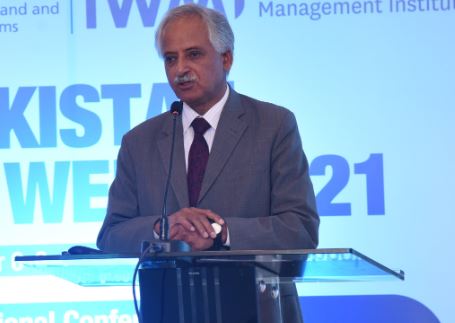
“We are facing groundwater depletion in Islamabad at one meter/annum, as groundwater is helping meet our requirements by 60% in agriculture, by 90% for drinking purposes and by 100% for industry” he added by saying “the situation needs to be immediately addressed.”
Experts also said that water crisis in the Pakistan was due to poor water governance and system inefficiency. Pakistan needs to improve on-farm water use efficiency, governance, site specific solutions, legislation improvement, and mainstreaming of youth.
Youth engagement in all programs was critical as they were user of water and needed a behavioural change towards the commodity usage.
Simi Kamal, Board Member IWMI in her remarks said that water security needs to be looked from the perspective of how water is used, as up to 90% of our water resources are used in the agriculture sector.
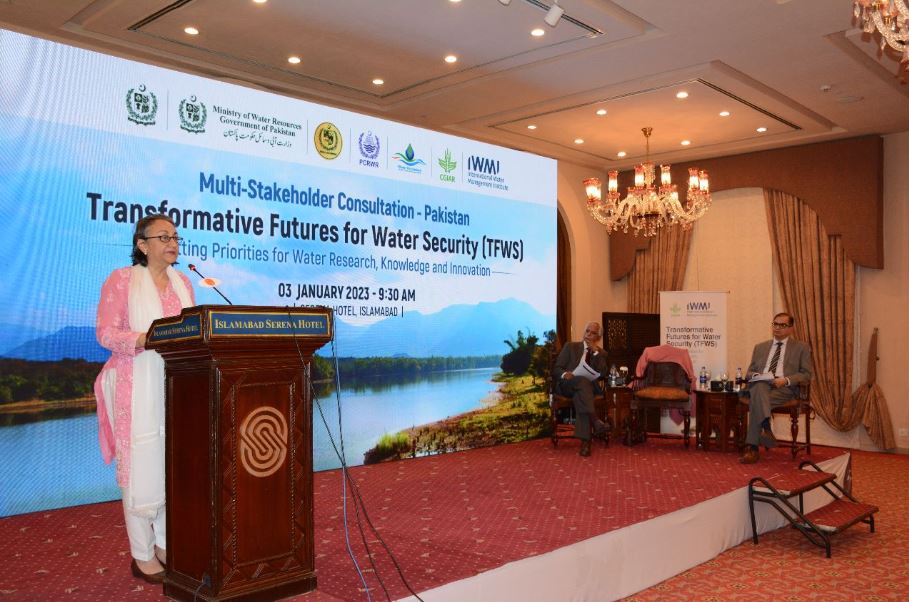
“We need to bridge the policy action gap. Trust building is important between the institutions & citizens. Youth must be engaged in research and should be provided data and information they need”, she added.
She further said that the youth were technology savvy, entrepreneurial, understand the audience, are eager to study and learn new things, and work hard to change the world.
She further said, “Group action for water is political and is needed not based on elite groups’ interest but on the survival of climate change affected communities.”
The informative concluding session was followed by the formation of five working groups to discuss multifaceted issues on water security that provided key indicators and suggestions to address the issue with a systematic approach guided by ground realities and scientific evidence to deal with the climate shocks.
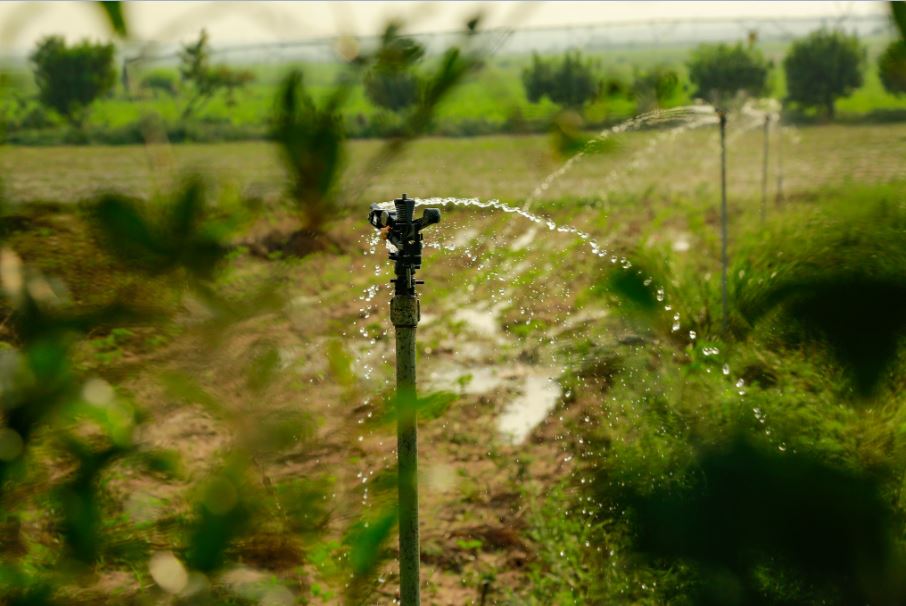
The International Water Management Institute is a non-profit, scientific research organization focusing on the sustainable use of water and land resources in developing countries. IWMI works in partnership with governments, civil society and the private sector to develop scalable agricultural water management solutions that have a real impact on poverty reduction, food security and ecosystem health. Headquartered in Colombo, Sri Lanka, with regional offices across Asia and Africa.
By: M.A
Email: VOW2025@Gmail.com



